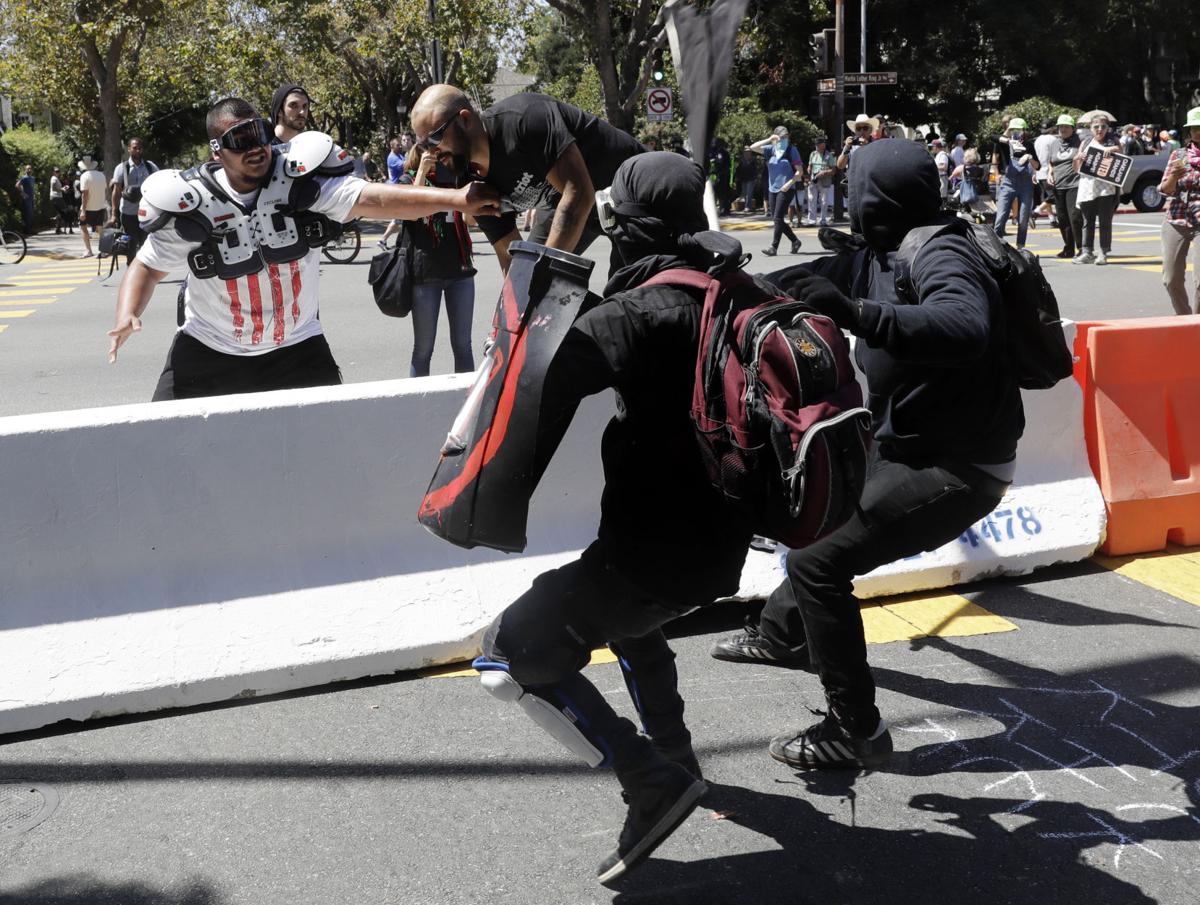Thinking of wearing a Trump mask to a political demonstration?
A chicken suit to a protest?
Or even fake nose and glasses to a public event?
A proposed new law could send you to prison for a year — and a dozen times longer if you or someone else at the event was involved in property damage.
Legislation crafted by Rep. Jay Lawrence, R-Scottsdale, would make it a felony to wear any sort of disguise to evade recognition or identification in the commission of any public offense.
But HB 2007 goes even farther. Masks and costumes also would be illegal at civil protests, political events or any “public event.”
The only exceptions would be for those wearing a disguise “for a business-related purpose” or anywhere “a disguise may generally be viewed as part of acceptable attire.”
Lawrence said he began writing the legislation following TV news reports this past summer.
“We’ve seen masked, hooded people breaking windows, hitting people, fighting with police,” he said.
The first-term lawmaker acknowledged that has not occurred in Arizona, but said there have been threats.
“This legislation says those threats, if carried out, have penalties,” Lawrence said.
Will Gaona, attorney for the American Civil Liberties Union of Arizona, said the proposal is not designed to protect the public but instead to chill the First Amendment rights of those who protest.
“It’s important to keep in mind that the ‘disguise’ that a person may wear, that disguise itself may be expressive,” he said.
“Imagine a person wearing some kind of Donald Trump costume to a protest,” Gaona said. And on the other side of the political spectrum, he said someone dressed up in a white wig and colonial garb at a tea-party event could be considered in partial disguise.
Lawrence insists that’s not the kind of thing his proposal is designed to stop.
“That type of disguise would not be the same as antifa and others who wear masks and hoods to hide their identity,” he said, referring to the self-named anti-fascist movement. So, for example, he said it would be “perfectly acceptable” if someone protesting his views or his legislation shows up at a rally wearing a chicken suit.
Anyway, Lawrence said he believes his measure has an escape clause of sorts to prevent prosecution of those who have no ill intent: It allows a police officer to detain someone wearing a disguise to verify that person’s identity “and to determine if the person has committed a public offense.”
Gaona, however, said none of that will keep the person whom the police unmask from getting arrested. That’s because the bill itself makes it a public offense just to wear a mask at a public event.
“So by the nature of the way it’s written, you’ve already committed a public offense” even before a police officer asks for ID.
That isn’t the only problem Gaona has with HB 2007. He said it’s unconstitutionally vague because it is impossible for a reasonable person to know what conduct will get him or her in trouble.
“For example, the bill refers to a partial or a complete disguise,” he said.
“Well, what does that mean? If I wear glasses and a fake mustache to a protest, am I guilty of a felony?”
There are various laws across the nation dealing with the use of masks and disguises.
But Gaona said that, in general, they are nowhere near as broad and encompassing as what Lawrence is proposing.
For example, Massachusetts provides for a one-year prison term for wearing a mask. But that law is broken only in situations where there is intent to obstruct execution of the law or to intimidate, hinder or interrupt an officer or other person exercising his or her rights.
By contrast, there is an Alabama law, with a version dating to 1949, that makes it a misdemeanor to appear in public wearing a mask. That broad-based legislation originally was enacted to deal with Ku Klux Klan members.
In general, courts have upheld similar laws.
For example, a federal appeals court in 2004, looking at a New York statute, said there is a First Amendment right to anonymous speech, saying that covers things like having to disclose an organization’s members or the names of people who produce political leaflets. “In contrast, the Supreme Court has never held that freedom of association or the right to engage in anonymous speech entails a right to conceal one’s appearance in a public demonstration,” the court concluded.
But a California state court struck down an anti-mask law there in 1979, ruling it was overly broad. That state’s law now prohibits disguises in public — but only in commission of public offense unrelated to wearing the mask itself.
Even if a basic anti-mask law is legal, Gaona said there are other provisions in what Lawrence wants that he believes are not.
He pointed out that while the legislation provides for a year in state prison simply for wearing a mask at public events, there is an enhanced penalty “if the person who is wearing the disguise has direct or indirect involvement in an offense involving property damage, injury or death.”
What that includes, Gaona said, is someone in a mask spray-painting graffiti on a wall during a demonstration. The penalty, he said, is in the same category as rape or manslaughter: 12.5 years for a first offense “which is incredibly punitive.”
Worse yet, he said, is that part about “indirect involvement.”
“If I’m at a protest and I happen to be wearing some kind of disguise, and somewhere in the course of that protest there’s property damage, am I indirectly involved in that offense?” he asked.
Lawrence suggested that questions being asked about the proposal were based on an overly “literal” reading of the law versus the intent. Still, he conceded there are questions that may need to be addressed if and when the measure gets a hearing.





